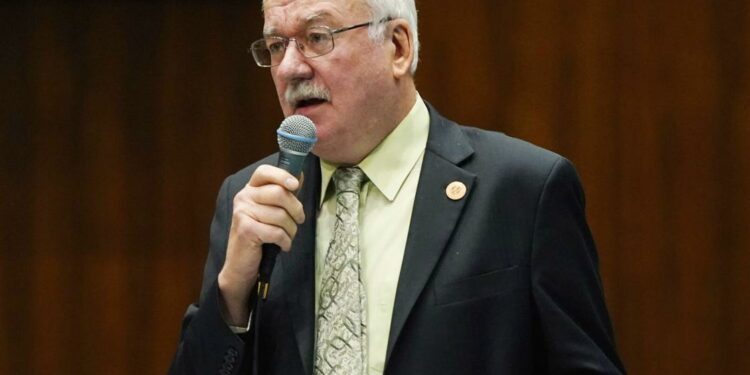Rep. Analise Ortiz
Q: Senator, specifically, how are you defining a public safety crisis?Â
Kavanagh:Â 362 individuals since 2021 have entered the country and were identified as being on the terrorist watch list. 21,963 people in 2024 had criminal records who were apprehended. Many of them were gang members. They’re smuggling fentanyl, which is killing our children. Gang members, terrorists, drugs to kill our children. If that’s not a public safety crisis, what is?
Ortiz:Â Fentanyl is impacting my community. And what the facts tell us is that over 90% of the fentanyl that is smuggled into the United States comes through those legal ports of entry, smuggled by United States citizens. Therefore, if you continue to assert that Prop. 314 only impacts outside of the ports of entry, it will do nothing to stop the 90% of fentanyl smugglers that are coming through the legal ports of entry. This is the job of the federal government.Â
Kavanagh:Â 90% may be coming through the border crossings, but that isn’t just the port of entry. That includes the road blocks and blockades and roadways nearby. But that means 10% is not going through them. 10% is going in between the borders.Â
Q: The nonpartisan Grand Canyon Institute’s analysis pegs the cost of implementing Prop. 314 at $325 million per year. Where will the money to cover many of these predicted expenses come from?
Kavanagh: That is a bogus, absurd analysis. It is based on the assumption that every time one of these people are apprehended illegally (they will be prosecuted). This law says that when they are apprehended, if they didn’t do it before, if they don’t have warrants, they have the option of being escorts out of the country. If they don’t and they’re found guilty, then they go to prison. Let me ask you, how many people that are apprehended do you think are going to say, ‘Well, I think I’d rather spend six months in an Arizona prison than just leave.’ These prison costs are nonexistent except for (who) will go to prison — the ones that had fentanyl, the ones that have drugs and outstanding warrants because they committed felonies in this country before.Â
Ortiz: Sen. Kavanagh is not speaking to you in the way this bill will actually be implemented and the reality of what happens on the ground. I have talked to migrants who have gone through horrendous situations on their journeys, many of them from Central America through Mexico and into the United States. In Mexico, they were faced with horrible exploitation, gang crimes, sexual assaults. And when it comes to having a stay in an Arizona prison or going back to those horrific life-threatening situations in Mexico or in their home country, no one is going to go back voluntarily. And the director of our Department of Corrections himself has said this will cost the department $250 million each year on top of their billion-dollar budget currently. We do not have the money to afford that as a state. We are in a budget deficit right now.
Q: The Arizona Department of Corrections issued a memo that they have concerns about the space to hold them, including sufficient staffing and bed space to accommodate a potential influx of approximately 1,500 new inmates per year under this proposition.Â
Kavanagh: We have already allocated for the budget year $56 million for border security and enforcement. That money is available. But once again, these are worst-case bogus scenarios. Nobody is going to say ‘send me to an Arizona prison’ when they’re given the option of being driven to the border and going back across. In addition, I do not understand why Rep. Ortiz wants to let people come between the crossings. We should make it dangerous for criminals to come in between the legal border crossings to push these people to the legal crossings. Women with children shouldn’t be trekking across the desert in illegal crossings. They should be directed to the Border Patrol where they’ll get food, medical care, legal entry, and they’ll be able to be transported around the country as opposed to being led in through a dangerous desert in between the crossings by a coyote. And to suggest that we’re sending children to prisons is ridiculous. Everyone knows that never happened and will never happen.Â
Ortiz: Mr. Kavanagh said it’s never happened. I was just down on the Arizona border and saw women and children detained by Border Patrol and they were in facilities and trying to keep themselves cool. And under this bill, they would be directed to an Arizona state prison. People are seeking asylum in this country. They are in desperate situations crossing potentially not at a legal port of entry because they are trying to get here by any means necessary. One of the other problems is that the vast majority of folks want to come here and wait out their fair day in court, which is their right under federal law to seek asylum and to wait and have their fair day before an immigration judge. Right now that process could take up to 10 years. And many of these folks are simply passing through Arizona to await their fair day in court.
Kavanagh: A large number of these people are bogus seekers of asylum that don’t qualify. They are inundating us.
Q: The proposition would create at least four new state crimes, according to the Legislative Council, (including) one that would keep an undocumented person from receiving public benefits; crack down on those who knowingly filed false information; and allow local law enforcement to charge a person who comes to Arizona illegally unless that person had been granted asylum. Are there any state crime (laws) already in affect (in these areas) that could have better enforcement, as opposed to creating a new proposition?Â
Kavanagh: First of all, these are not all new crimes. Fentanyl, it’s already illegal to sell fentanyl. We’re simply saying if you know it’s fentanyl and you sell it to somebody and they did, you’re getting an enhanced penalty. It’s already a crime to present false documents in an attempt to get benefits. So, actually what we’re doing is we’re saying that government agencies that give out benefits and financial aid have to run the person through the E-Verify system. And if they don’t quality, they’re not arrested, but they don’t get the benefits. Because taxpayers shouldn’t be paying for benefits for illegal aliens.Â
Ortiz: We don’t have those state crimes as it relates to immigration right now because it violates the Constitution. It is outside of the scope of local law enforcement to enforce federal immigration law. What is very important for people to recognize is that when we’re talking about enforcing federal immigration law, we’re talking about Border Patrol has a specific area they patrol on the U.S./Mexico border. By making this a state crime, people anywhere in the state could be arrested, detained, and potentially deported or detained for being suspected of being in this country without authorization. That means we’re going to see the civil rights of citizens and lawful residents violated.
Kavanagh: We’re not preempting the Constitution. We’re not preempting federal immigration law. We’re not saying anybody who feds say can come in shouldn’t. We’re simply saying we want to help the federal government. Because we all suffer from the danger and the expense of illegal immigration. This bill simply says if a police officer has probable cause to believe that somebody’s crossing the border, and that’s a high standard.Â
Q: The federal government has claimed for a long time sole jurisdiction of U.S. immigration laws to arrest and deport migrants. If the proposition is passed, do you believe any of the provisions will hold up in court given the near-certain likelihood they will face lawsuits?
Ortiz: I would hope that the provisions would be struck down once again by the courts. What worries me is that I believe my Republican colleagues are banking on the fact that we have a new (U.S.) Supreme Court, a more conservative Supreme Court. And who’s going to foot the bill for the constitutional challenges that are inevitably going to come? It’s going to be you, the taxpayers. And when we talk about this proposition costing an estimated $325 million a year for the taxpayers, that estimate does not include the inevitable lawsuits. We look at the racial profiling cases from the Maricopa County Sheriff’s Office that are now upwards of $300 million. That’s money that should be going to our local public schools, to housing and health care.Â
Kavanagh: There will be no cost defending the law. The law clearly says that it’s only effective if the law in Texas or a similar law is ruled constitutional and enacted. So if the Texas law is ruled unconstitutional, this never takes effect. And in terms of cost, Rep. Ortiz does a static analysis. But to the extent that this will deter illegal immigration, reduce crime, reduce unlawful benefits, how many millions of dollars will we save in benefits? In law enforcement costs, in hospital costs? A dynamic analysis shows that this bill will save the taxpayer money.Â
Q: Senator, since you brought up the Senate bill in Texas, it’s currently being held up in courts. So because it is being litigated at the moment, why is this the right time to vote on Prop. 314?Â
Kavanagh: For the same reason that in a ball game, the managers have a pitcher in the warm-up pen. if the Texas law is ruled constitutional, we want this to go into effect immediately. It’s about protecting people, and we want to be ready to do it on day one.Â
Ortiz: The reason this is on your ballot this year is because it’s an election year, and Republicans needed something to feed to their bases, knowing that this is unconstitutional, knowing that there is no funding attached to it.Â
Get Government & Politics updates in your inbox!
Stay up-to-date on the latest in local and national government and political topics with our newsletter.
Source link : http://www.bing.com/news/apiclick.aspx?ref=FexRss&aid=&tid=670ae0101ceb4fd493f65d0bb9fb2771&url=https%3A%2F%2Ftucson.com%2Fnews%2Fstate-regional%2Fgovernment-politics%2Felections%2Fthe-debate-over-arizonas-border-policing-proposition%2Farticle_3a439b50-79ef-11ef-8f88-1f0507b405e7.html&c=14838369815230910878&mkt=en-us
Author :
Publish date : 2024-10-12 02:00:00
Copyright for syndicated content belongs to the linked Source.












